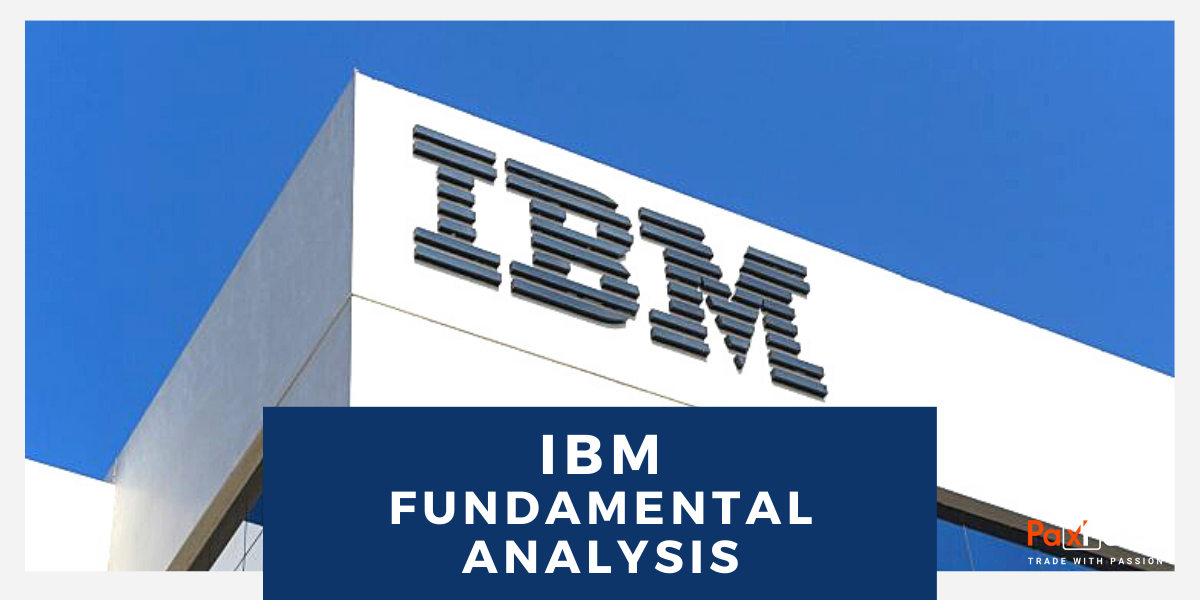
Source: PaxForex Premium Analytics Portal, Fundamental Insight
Many tech companies are currently championing artificial intelligence (AI), but few can claim the longstanding history of International Business Machines, which began exploring AI in the 1950s.
In the present day, IBM primarily focuses on the dual technologies of AI and cloud computing, with these sectors projected to be enormous markets worth $184 billion and $676 billion, respectively, in 2024.
Given the rapid expansion of the AI market and IBM's extensive experience, the question arises: is now the time to invest in this storied tech giant? To answer this, let's delve into IBM's current standing and its potential as a long-term investment.
IBM, a mature company with over a century of history, isn't typically seen as a high-growth tech firm. However, since CEO Arvind Krishna took the helm in 2020 and steered the company towards AI and cloud computing, IBM has enjoyed a steady increase in revenue.
This trend has continued into 2024. IBM's second-quarter performance was strong, showcasing its ability to secure a portion of the competitive AI and cloud markets.
In the second quarter, IBM's software division, which includes AI and cloud sales, reported a 7% year-over-year revenue increase to $6.7 billion. This contributed to a total Q2 revenue of $15.8 billion, up from $15.5 billion in 2023. These figures highlight IBM's solid financial performance.
IBM's gross margin rose to 56.8% in Q2, compared to 54.9% in 2023. Its net income for the quarter reached $1.8 billion, up from $1.6 billion the previous year, boosting its diluted earnings per share (EPS) to $1.96 from $1.72 in 2023.
Additionally, IBM's free cash flow (FCF) for Q2 increased to $2.6 billion from $2.1 billion in 2023. The company's impressive first-half FCF results have led it to project a 2024 free cash flow exceeding $12 billion, compared to $11.2 billion last year.
Free cash flow is a critical metric as it represents the cash profits available for reinvestment, debt reduction, and dividend payments. IBM's growing FCF signals that its dividend is secure, a key attraction for investors. Currently, IBM's dividend yields a substantial 3.5%.
Furthermore, the growth in FCF indicates that IBM is well-positioned to continue its unbroken 29-year streak of annual dividend increases. IBM's commitment to reliable dividends is evident, having made consecutive quarterly payments since 1916.
IBM's strong Q2 results and attractive high-yield dividend present compelling reasons to consider investing in the company. However, not all aspects of its operations showed growth in the second quarter.
The consulting division, which contributed $5.2 billion to IBM's $15.8 billion Q2 revenue, experienced a 1% year-over-year decline. CEO Arvind Krishna attributed this dip to factors such as interest rates and inflation impacting decision-making and discretionary spending in consulting.
The consulting segment is crucial for IBM, as it, along with the software division, accounted for over 75% of the company's Q2 sales. Thousands of IBM consultants assist customers in integrating AI into their organizations.
IBM is also leveraging its consulting workforce to sell cybersecurity products for Palo Alto Networks. This partnership, announced in May, will need time to determine its impact on IBM's consulting revenue.
In addition to partnerships, IBM is investing in future technologies like quantum computing to drive revenue growth. Quantum computers, which use subatomic particles for complex calculations, promise to tackle challenges beyond the capabilities of today's supercomputers.
The potential of quantum computing is immense, as it can easily break most current cybersecurity protections and significantly enhance AI technology. However, quantum computing is still in its early stages, comparable to AI in the 1950s when IBM first began exploring it. It may take some time to realize the benefits of IBM's investments in quantum computing. In the meantime, investors can benefit from IBM's reliable dividend.
IBM's focus on AI, cloud computing, and quantum computing, combined with its revenue growth, increasing free cash flow (FCF), and dependable dividend, makes it an appealing long-term investment, especially for those seeking passive income.
Despite challenges in its consulting division, IBM's Q2 performance was strong enough to boost its share price, which is now approaching the 52-week high of $199.18 reached in March.
Given this, it might be wise to wait for a price dip before buying. For now, IBM is a stock worth monitoring.
As long as the price is above 183.00, follow the recommendations below:
- Time frame: D1
- Recommendation: long position
- Entry point: 186.58
- Take Profit 1: 195.00
- Take Profit 2: 200.00
Alternative scenario:
If the 183.00 level is broken-down, follow the recommendations below:
- Time frame: D1
- Recommendation: short position
- Entry point: 183.00
- Take Profit 1: 180.00
- Take Profit 2: 176.00













